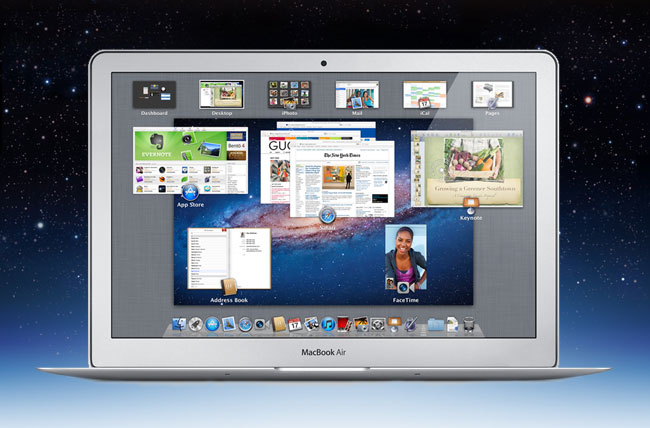With powerful hardware working together with an industry-leading camera system and intuitive AI experiences, everyday tasks have never been easier and faster
App of the week: Moneybook
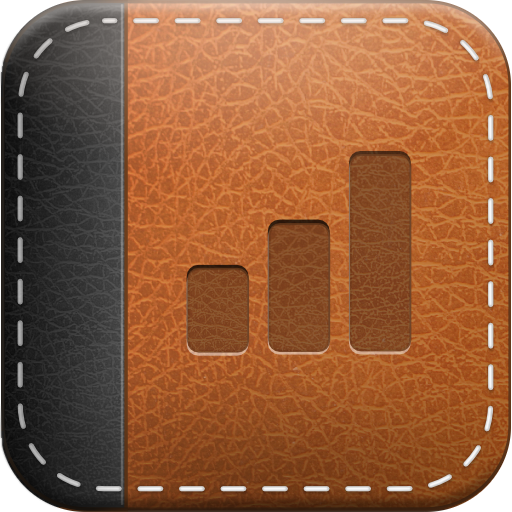
 This week I take a look at Moneybook, a simple yet powerful personal finance app that looks great and is unrivalled in ease of use.
This week I take a look at Moneybook, a simple yet powerful personal finance app that looks great and is unrivalled in ease of use.
Pay day: the long-awaited day of the month that sees your bank account being credited for all the hard work that you’ve put in over the last four weeks. For me, the week leading up to this pivotal day is a bit of a weird time, kind of bittersweet, actually. On the one hand I’m excited and planning what I’ll do with my newly acquired funds, but on the other hand it is also a time of remembrance and reflection, a time of deep questioning and logging in to my Internet banking to see exactly where all of my hard-earned cash has disappeared to. Again.
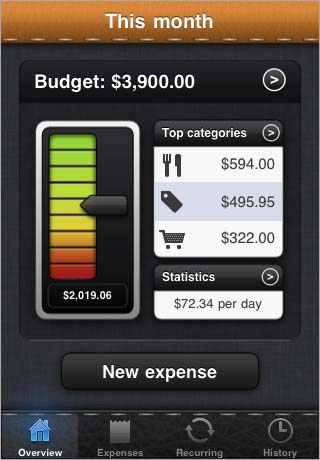 After pouring over my transaction history, I realize that I could probably be saving a lot of the cash that I’ve spent on useless crap. I make a rough budget for the next month, but end up losing it (much like my to-do lists). As frustrating as this ends up being, I keep repeating the same mistake month after month. Money leaves my account and I don’t know where it all went.
After pouring over my transaction history, I realize that I could probably be saving a lot of the cash that I’ve spent on useless crap. I make a rough budget for the next month, but end up losing it (much like my to-do lists). As frustrating as this ends up being, I keep repeating the same mistake month after month. Money leaves my account and I don’t know where it all went.
Enter Moneybook, a great looking, easy to use and powerful expense tracker from the guys who brought us Listbook. Where Moneybook triumphs over competing expense tracking solutions is in its beautiful design and pure simplicity of use. Simply add your main salary on the overview window and log your expenses according to each category as the month goes by. Moneybook then displays a great looking gauge of how much money you’ve spent versus how much you still have left.
Logging an expense is quick and painless. Enter the amount spent, assign it to one of the preloaded expense categories, add some notes if you wish (eg drinks at Van Hunks), and click save. The app will then display the expense on a really awesome looking piece of digital receipt paper, which can be viewed and edited on the transactions page. The developers have included a number of broad expense categories within the app, and the creation of custom categories has not been allowed in order to keep the app the simplest. That’s 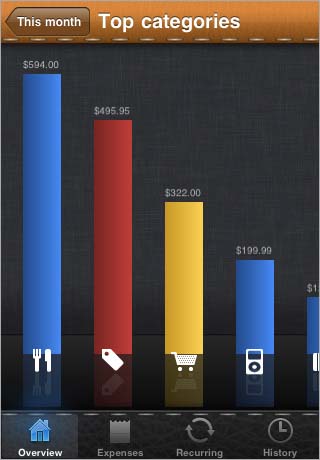 just how they roll I guess, and hats off to them for taking that stand. Even if it may gall some.
just how they roll I guess, and hats off to them for taking that stand. Even if it may gall some.
Something that has always annoyed me about the various finance and expense apps that I’ve used over the last few months is the inability to effectively deal with recurring transactions and debit orders. Not Moneybook. however. It has an entire page dedicated to these recurring transactions. So if your phone bill comes off of your account on the first of every month, just set it up and forget about it. Moneybook will deduct and assign the amount to the set category without you even having to worry about it.
Reporting and viewing your financial history is also a visual treat. Moneybook has one of the most brilliantly designed interfaces I have ever seen on an app. The reporting page is full of awesome, simple animations and is so good looking that I sometimes feel like I should spend a bit more money, just so that it looks nice and full. This is probably not a good thing. As with anything related to personal finance, security is always going to be an issue. Moneybook solves this with a simple PIN-code feature, which has been beautifully designed to stay in-tune with the rest of the app’s design.
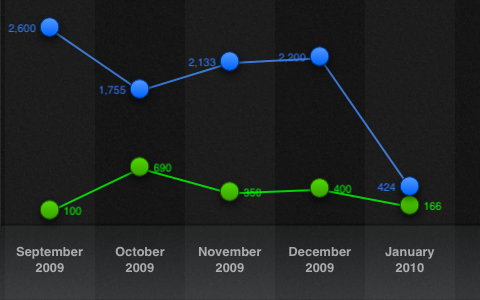 The only problem I’ve experienced so far with Moneybook is the inability to change the main salary on the overview page. Once entered, it automatically adds the same salary every month, which can be a problem for those who receive commission, income from other jobs and different tax deductions and bank charges. I’m sure there is a way around this, or an update on the way. Surely?
The only problem I’ve experienced so far with Moneybook is the inability to change the main salary on the overview page. Once entered, it automatically adds the same salary every month, which can be a problem for those who receive commission, income from other jobs and different tax deductions and bank charges. I’m sure there is a way around this, or an update on the way. Surely?
But apart from that one hiccup, Moneybook is a great app to have. Noidentity have managed to create a fully functional, great looking and easy to use app that steers away from Excel-like rigidity and cheesy dollar symbols of most other personal finance apps. For $2.99, it also sets itself apart from the overcomplicated stuffiness of those that cost $9.99 and above.
Name: Moneybook
Publisher: noidentity gmbh
Category: Personal Finance
Price: $2.99
Size: 8.2 MB
